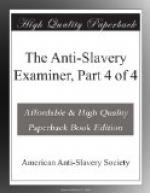[Footnote 86: Pittsburg pamphlet p. 12.]
According to Professor Hodge’s According to Professor Hodge’s account of the definition of Slavery_, requisitions of Christianity_,
The spring of effort in the The laborer must serve at the laborer is a fair compensation. discretion of another.
Free scope must be given for He is deprived
of personal
his moral and intellectual liberty—the
necessary condition,
improvement. and living soul
of improvement,
without
which he has no control
of
either intellect or morals.
His rights as a husband and The authority
and claims of the
a father are to be protected. master may throw
an ocean between
him
and his family, and separate
them
from each other’s presence
at
any moment and forever.
Christianity, then, requires such slavery as Professor Hodge so cunningly defines, to be abolished. It was well provided for the peace of the respective parties, that he placed his definition so far from the requisitions of Christianity. Had he brought them into each other’s presence, their natural and invincible antipathy to each other would have broken out into open and exterminating warfare. But why should we delay longer upon an argument which is based on gross and monstrous sophistry? It can mislead only such as wish to be misled. The lovers of sunlight are in little danger of rushing into the professor’s dungeon. Those who, having something to conceal, covet darkness, can find it there, to their heart’s content. The hour cannot be far away, when upright and reflective minds at the South will be astonished at the blindness which could welcome such protection as the Princeton argument offers to the slaveholder.
But Professor Stuart must not be forgotten. In his celebrated letter to Dr. Fisk, he affirms that “Paul did not expect slavery to be ousted in a day."[87] Did not EXPECT! What then! Are the requisitions of Christianity adapted to any EXPECTATIONS which in any quarter and on any ground might have risen to human consciousness? And are we to interpret the precepts of the gospel by the expectations of Paul? The Savior commanded all men every where to repent, and this, though “Paul did not expect” that human wickedness, in its ten thousand forms would in any community “be ousted in a day.” Expectations are one thing; requisitions quite another.
[Footnote 87: Supra, p. 7.]




